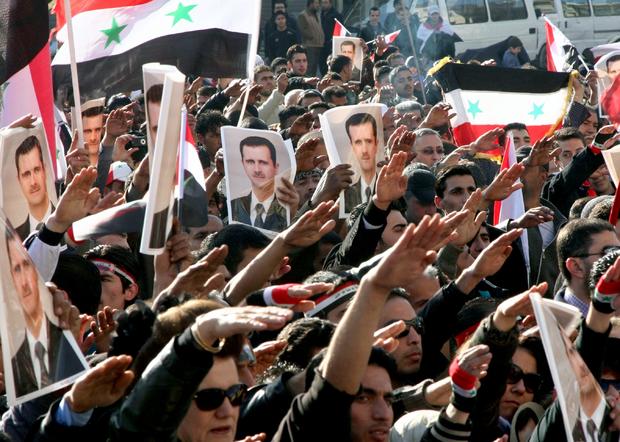Syria signs deal to let in foreign observers
Syria signed on Monday an Arab League plan which will allow foreign observers into the country, after coming under intense pressure from its neighbors and the rest of the world to end the nine-month crackdown on anti-government protesters.
The last-minute acceptance of the plan comes just two days before a meeting of Arab ministers which they had set as the deadline for Syrian compliance, under the threat of taking the issue to the U.N. Security Council, but Syria did manage to win amendments to the document before signing it.
"We wouldn't have agreed to sign the protocol had our reservations not been taken into consideration, no matter what ultimatum they issue," said Foreign Minister Walid Mouallem at a news conference in Damascus announcing the signing.
Deaths escalate as Syria mulls observers
Syrian army shoots protesters after prayers
US: Assad's Syria regime a "dead man walking"
"After the amendments, and as we are seeking a political solution under the Arab fold as soon as possible, I say that the agreement is a beginning of cooperation between Syria and the Arab League and the observers who represent the Arab world are welcome," Mouallem added.
Deputy Foreign Minister Faisal al-Maqdad signed the document in Cairo earlier Monday.
According to Arab League Secretary-General Nabil al-Arabi, the first group of Arab observers was to be dispatched to Syria by the middle of the week.
The Arab League had given Damascus until Wednesday to sign the protocol, saying if President Bashar Assad's government failed to do so, it was likely to turn to the United Nations Security Council to try and end the deadly violence, which started in mid-March and which, according to U.N. estimates has claimed more than 5,000 lives.
The League's plan calls for Syria's government to pull troops out of towns that have turned against the regime, free thousands of political prisoners, start a dialogue with the opposition, and allow foreign monitors into the country.
Mouallem insisted "Syrian sovereignty is totally protected in the protocol," in reference particularly to the amendments added at the last minute. He said a committee was being formed to coordinate the Arab League's work inside Syria with the government, and that Syrian police will accompany observers inside the country, for their protection.
The other key point in the amendments is that the protocol is designed to remain in place for one month, with the possibility of a one-month extension, "with the acceptance of both sides," rather than the initially devised two-month plan.
Syria's top diplomat went on to say Damascus was not responsible for any "stalling," and that some Arab countries - which he did not name - had been holding out in hopes of pushing the issue to the Security Council for tougher action against his country.
Long seen as a weak institution dominated by the region's autocrats, the League avoided any punitive action against its 22 members for decades, but pressure from Gulf Arabs already angry at Syria's alliance with regional rival Iran, and shock at the scale of the Syrian bloodshed, have galvanized the group.
Damascus blames foreign-backed armed groups for causing the violence.
Nineteen of the Arab League's 22 members voted last month for a range of sweeping sanctions that include a travel ban on senior Syrian officials, freezing Syrian government assets, halting trade dealings with the central bank and stopping Arab investment.
The sanctions, which are as potent in substance as they are symbolically, are expected to plunge the country deeper into crisis and cut off commercial ties to Syria's Middle East neighbors.
Tourism and oil, both pillars of the economy before this year, are likely to further crumble and the country's attempts to expand its fledgling banking, property and retail industries will also take a hit.
Syria's state-run TV channels showed hours of live video Monday of huge gatherings in the capital; thousands carrying Syrian flags, pictures of the Syrian leader and chanting the national anthem in support of Assad and his government.
Assad, 46, insists his forces are fighting insurgents backed by foreign powers, and that his critics are serving up a conspiracy to sow sectarian strife in the country of 23 million, which sits at the heart of the Arab Middle East.
Syria's state-run news agency SANA quoted Assad on Sunday as saying in front of an Iraqi delegation that Syria has, "dealt positively with proposals presented because it's in (Syria's) interest for the world to know what is happening in the country away from misinformation."
Events on the ground in Syria are difficult to verify, however, as the government does not allow most independent journalists to operate freely.
Long-time Syrian ally and arms supplier Russia took a step closer to the Western position on Thursday when it presented a surprise draft resolution at the United Nations which stepped up its criticism of the bloodshed in Syria.

